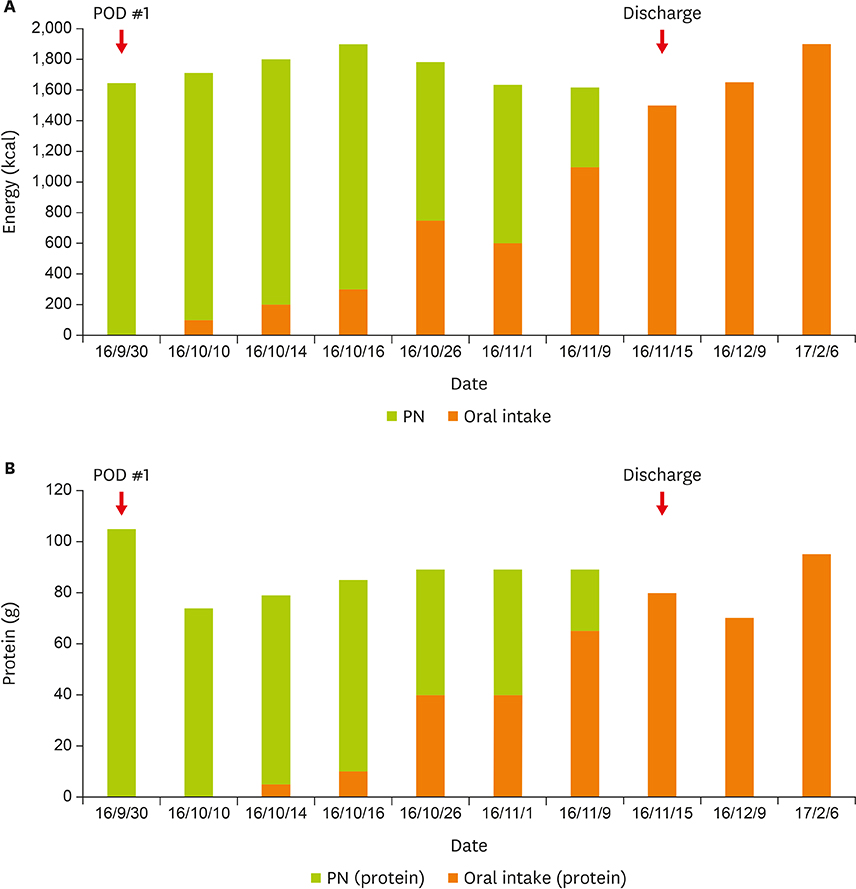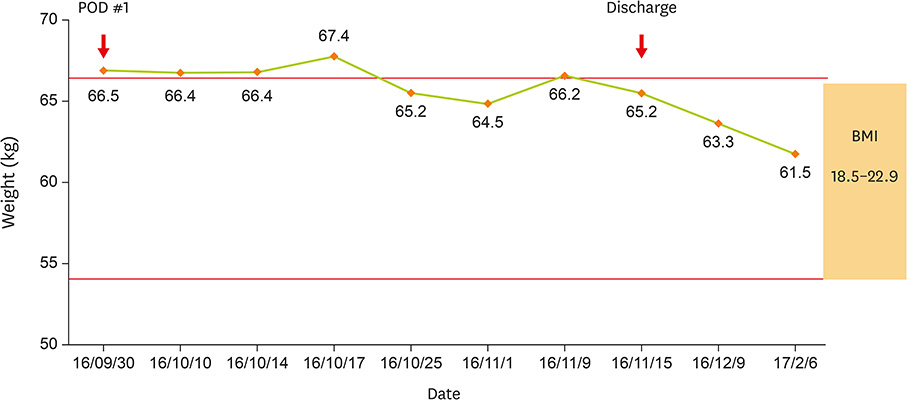Clin Nutr Res.
2017 Jul;6(3):221-228. 10.7762/cnr.2017.6.3.221.
Intensive Nutrition Management in a Patient with Short Bowel Syndrome Who Underwent Bariatric Surgery
- Affiliations
-
- 1Department of Food Service and Nutrition Care,Seoul National University Hospital, Seoul 03080, Korea.
- 2Nutritional Support Team,Seoul National University Hospital, Seoul 03080, Korea. appe98@snu.ac.kr
- 3Department of Pharmacy,Seoul National University Hospital, Seoul 03080, Korea.
- 4Division of Gastrointestinal Surgery,Department of Surgery,Seoul National University College of Medicine, Seoul 03080, Korea.
- 5Cancer Research Institute, Seoul National University College of Medicine, Seoul 03080, Korea.
- 6Department of Nursing Service,Seoul National University Hospital, Seoul 03080, Korea.
- KMID: 2385627
- DOI: http://doi.org/10.7762/cnr.2017.6.3.221
Abstract
- Many individuals with short bowel syndrome (SBS) require long-term parenteral nutrition (PN) to maintain adequate nutritional status. Herein, we report a successful intestinal adaptation of a patient with SBS through 13 times intensive nutritional support team (NST) managements. A thirty-five-year-old woman who could not eat due to intestinal discontinuity visited Seoul National University Hospital for reconstruction of the bowel. She received laparoscopic Roux-en-Y gastric bypass (RYGB) due to morbid obesity in Jan 2013 at a certain hospital and successfully reduced her weight from 110 kg to 68 kg. However, after a delivery of the second baby by cesarean section in Jul 2016, most of small bowel was herniated through Peterson's defect, and emergent massive small bowel resection was performed. Thereafter, she visited our hospital for the purpose of intestinal reconstruction. In Sep 2016, she received side-to-side gastrogastrostomy and revision of double barrel enterostomy. The remaining small bowel included whole duodenum, 30 cm of proximal jejunum, and 10 cm of terminal ileum. Pylorus and ileocecal valves were intact. The patient given only PN after surgery was provided rice-based soft fluid diet after 10 day of operation. Through intensive nutritional management care, she could start solid meals, and finally stop the PN and eat only orally at 45 days postoperatively. Three nutritional interventions were conducted over 2 months after the patient was discharged. She did not require PN during this period, and maintained her weight within the normal weight range. Similar interventions could be used for other patients with malabsorption problems similar to SBS.
MeSH Terms
Figure
Reference
-
1. Kelly DG, Tappenden KA, Winkler MF. Short bowel syndrome: highlights of patient management, quality of life, and survival. JPEN J Parenter Enteral Nutr. 2014; 38:427–437.2. Pironi L, Arends J, Bozzetti F, Cuerda C, Gillanders L, Jeppesen PB, Joly F, Kelly D, Lal S, Staun M, Szczepanek K, Van Gossum A, Wanten G, Schneider SM. Home Artificial Nutrition & Chronic Intestinal Failure Special Interest Group of ESPEN. ESPEN guidelines on chronic intestinal failure in adults. Clin Nutr. 2016; 35:247–307.3. Lee TU. Short bowel syndrome. J SurgCrit Care. 2012; 2:5–7.
Article4. Kumpf VJ. Pharmacologic management of diarrhea in patients with short bowel syndrome. JPEN J Parenter Enteral Nutr. 2014; 38:38S–44S.
Article5. Rintala RJ, Pakarinen M, Wester T. Current concepts of intestinal failure. Switzerland: Springer;2016.6. Parrish CR, DiBaise JK. Short bowel syndrome in adults– part 2.Nutrition therapy for short bowel syndrome in the adult patient. Pract Gastroenterol. 2014; 40–51.7. O'Keefe SJ. Nutritional issues in the short bowel syndrome - total parenteral nutrition, enteral nutrition and the role of transplantation. Nestle Nutr Inst Workshop Ser. 2015; 82:75–90.8. Matarese LE. Nutrition and fluid optimization for patients with short bowel syndrome. JPEN J Parenter Enteral Nutr. 2013; 37:161–170.
Article9. Matarese LE, O'Keefe SJ, Kandil HM, Bond G, Costa G, Abu-Elmagd K. Short bowel syndrome: clinical guidelines for nutrition management. Nutr Clin Pract. 2005; 20:493–502.
Article10. Song JY, Kim HY. Nutrition support for pediatric short bowel syndrome. J Clin Nutr. 2014; 6:19–23.
Article11. Jeong SH, Lee HJ, Bae HJ, Kim Y, Yoo MW, Yoon YK, Yang HK. Factors affecting postoperative dietary adaptation in short bowel syndrome. Hepatogastroenterology. 2009; 56:1049–1052.12. Parrish CR. The clinician's guide to short bowel syndrome. Pract Gastroenterol. 2005; 67–106.
- Full Text Links
- Actions
-
Cited
- CITED
-
- Close
- Share
- Similar articles
-
- Anesthetic Management of Small Bowel Transplantation for Short Bowel Syndrome: A case report
- Nutritional Management of a Patient with a High-Output Stoma after Extensive Small Bowel Resection to Treat Crohn's Disease
- Short Bowel Syndrome Due to Infarction of the Superior Mesenteric Artery
- Case Report of an Adult Patient Who Underwent a Serial Transverse Enteroplasty Procedure for Short Bowel Syndrome Following an Esophagectomy and Total Gastrectomy
- Incidence and Management of Micronutrient Deficiencies in Post-bariatric Surgery Patients



